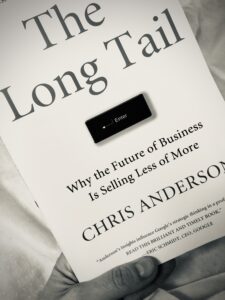 I picked up The Long Tail by Chris Anderson from a please-take-a-book-for-free-shelf somewhere or other. Might even have been at Malmö city library at the end of TEDxSlottsparken, come to think about it.
I picked up The Long Tail by Chris Anderson from a please-take-a-book-for-free-shelf somewhere or other. Might even have been at Malmö city library at the end of TEDxSlottsparken, come to think about it.
”We have been trained […] to see the world through a hit-colored lens.”
It’s one of those books where the concept has been well-known to be, the term long tail one I’ve likely used many times, never actually having read the book, a bit like Simon Sinek’s Start with why.
”One person’s noise is another’s signal. If a producer intends something to be absolutely right for one audience, it will, by definition, be wrong for another.”
Written in 2006, me reading it in 2020, it’s a bit of a funny throwback to the time when life was just starting to get so digital that it is today. There are references to MySpace but not Facebook, to Netflix and BlockBuster, but these were the days when Netflix was more or less solely a DVD-rental-by-snail mail-company. Twitter, iPhone, Instagram… nonexistent. That in and of itself is both a bit fun, and all the same, makes the book a bit dated, very clearly written when it was written.
”Niche products are, by definition, not for everyone.”
The concept itself though, the long tail, is still highly relevant, even though I would venture a guess to say that many probably still don’t really think about it actively, but rather unconsciously.
”Because the tools of production have entirely democratized, the population of producers is expanding exponentially, and now there’s little stopping those with the will and skill to create from doing just that.”
This is not a book where I’ve made many a marginalia-entries, quite the opposite. A dozen, perhaps. One dog-ear, but one which didn’t even make it into this post. It’s not a book you should spend time reading, honestly. I probably shouldn’t either, but… alas, I have, I did, and here I am.
I do find the will and skill to create interesting though. But I will save that for another piece.
”Fundamentally, a society that asks questions and has the power to answer them is a healthier society than one that simply accepts what it’s told from a narrow range of experts and institutions. If professional affiliation is no longer a proxy for authority, we need to develop our own gauges of quality. This encourages us to think for ourselves. Wikipedia is a starting point for exploring a topic, not the last word.”
The long tail does enable us –you, me, everyone– to find the little niche markets suited specifically for our personal needs, wants and wishes. And yes, that’s a place where I can be encouraged to think for myself, it makes it easier for me to find more perspectives than I could before. Perhaps.
However, it also makes it harder. Look at the bubbles of confirmation bias that we all live in nowadays, or at least I do, bubbles where ”someone else has thought for me”, making it very easy to stay within the boundaries of said bubble. That is not helpful, and not, I think, a sign of a healthy society. Wanting that, a healthy society that is, is something that requires more from me. It means I have to be very active and deliberate in what questions I seek to answer, and whose answers I choose to listen to. That’s necessary discernment for me while developing my own gauge of quality, and it’s an ongoing, evergreen process. It requires continuous work, never finished. Because those gauges need to be calibrated and re-calibrated over and over again as the world (and I) shift around me. Around us.
And that’s an insight I am happy to have gotten, an insight which makes it worth my time to have read The Long Tail. So. Perhaps. You should read it too, because you just might be answering a different question than the one I’ve just answered, or you’ll provide another answer to the same question, once you’ve finished reading it. Only way to know is to find out, by doing it. By reading it. Or at least reading up on the concept. If you do, please share any question and/or answer that shows up in you.